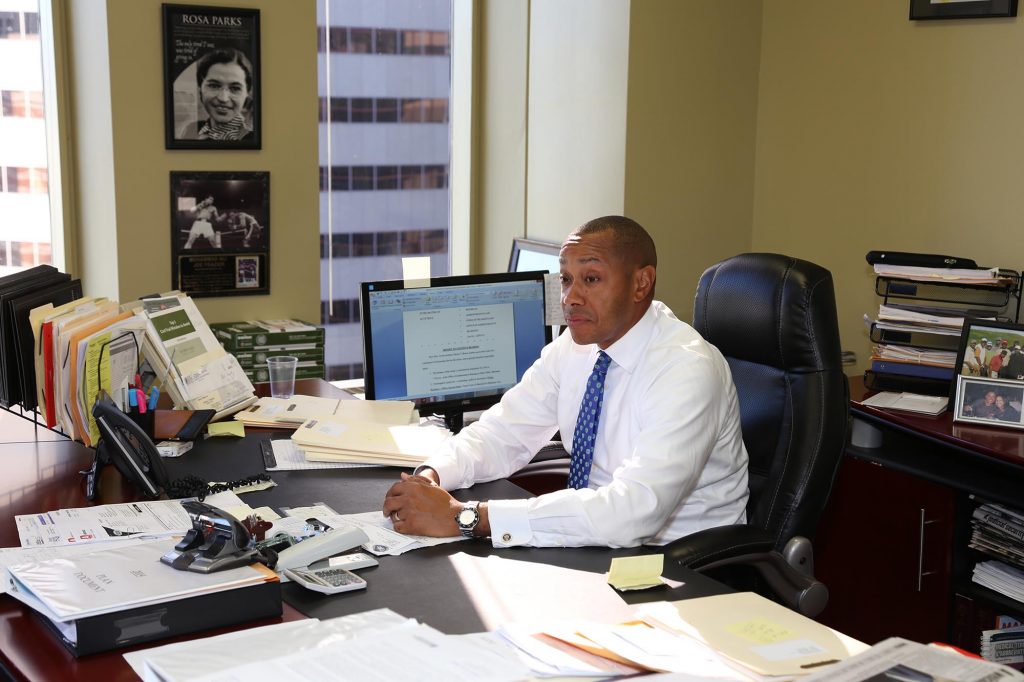Personal Injury Lawyer in Baltimore, MD

Accidents and injuries happen and, unfortunately, many of them occur through no fault of your own. Your life can change in an instant after a personal injury. Depending on the extent of your injuries, you may not be able to do the same work you did before. Your finances, health, and state-of-mind could all be negatively affected. At Mobley | Brown, LLP, we work diligently to see that you get the compensation you deserve. Our team of legal professionals knows the difficulties that come with a personal injury. With the combined experience of over 40 years, our attorneys have represented clients with passionate, professional, and dedicated service. We work tirelessly to see that you get the best possible outcome. Our personal injury attorney in Baltimore, MD, has experience handling a variety of personal injury cases, including:
- Defective Products
- Medical Malpractice
- Nursing Home Negligence
- Slips & Falls
- Truck Accidents
Personal Injury Attorneys Get Around the Red Tape
Paperwork and the legal system go hand-in-hand. The amount of paperwork involved in a claim can feel never-ending. It is easy to get overwhelmed. Allow our trained and experienced personal injury lawyers in Baltimore, MD, help you navigate the legal system. We know what documents to file and when to file them.
Along with helping you navigate the legal system, we also provide you with clear objectivity. Fear, frustration, and anger can be the driving force in decisions if you let them be. Our job is to help you make decisions that are best in the long run and not just the short term, along with providing exceptional legal counsel. A quick payout can be tempting, but it’s important to look at the entire picture to ensure you get the best deal possible.
Knowledgeable Personal Injury Lawyer
Work with an accident lawyer in Baltimore, MD, that has a history of successfully litigated cases. We provide our clients with compassionate and aggressive legal services. Everyone at our firm is dedicated to helping you get your situation resolved as quickly as possible.
What to Do After a Car Accident
Accidents can happen quickly, and it can be hard to remember everything you should do after one occurs. If you are like most people, you studied it in drivers education class in high school, then drove off with your freshly minted license and promptly forgot.
However, things have changed since the days when most of us took it in school. There are more cars on the road, traffic is heavier, and there is no telling how the other person involved in an accident may respond. Even if you always practice safe driving, it never hurts to go over what you do after a crash and how you can be prepared.
What to do after an accident:
1.Check for injuries
Before you do anything else, make sure you are okay and your passengers are, too.
2. Follow the law about moving your car or not
If local or state laws require you to move your car and you can do it safely, you should move it immediately. Not only is it the right thing to do, but it is also just good manners. It is not polite to stay in someone's way, even if that someone is another driver. If you cannot move your car, you should use your hazard lights to alert other drivers.
3. Contact law enforcement
You can help the 911 dispatcher by giving as much detail as possible. Be prepared to tell him or her your exact location, including the highway mile marker or closest intersection. Let the dispatcher know about potential injuries, the number of cars involved, and whether vehicles can get by on the road.
4. Exchange information with the drivers involved
Drivers affected should provide each other with their:
- Name
- Address
- Phone number
- Insurance company name
- Insurance policy number
- Name of the insured person and relationship to the driver
- Drivers license state and number
- License plate number for the driver and the owner of each vehicle
- Car year, make, model, and color
Resist the urge to apologize for the accident even if you think it might be your fault, or to keep it between parties. Law enforcement officers will determine the degree to which each driver may have contributed to the accident.
5. Record what happens
While you're on site, write down the location of the accident and how it happened. Take pictures of the damage done to all the vehicles involved. Ask witnesses for their contact information in case the drivers disagree about the events.
6. Place an accident report
Even if the law enforcement officers don't respond to the accident, which sometimes happens if there are no injuries, download an accident report form from your state's Department of Motor Vehicles website, fill it out and submit it.
7. Notify your insurance provider
Rather than relying on the goodwill of the other drivers to ensure that damages are paid for, submit an insurance claim.
Doing so can help you protect your finances in the long term and get your car fixed more quickly in the short term.
How to be prepared for an accident:
Keep essential items in your car's glove box, such as paper and pencil for taking notes, a card that lists local law enforcement agency contact numbers, and your medical allergies or conditions that first responders should know about in the event where medical assistance is necessary.
Of course these days, you may choose to keep much of this information in your cell phone under a file or note called "ICE" which tells first responders where to look "In Case of Emergency." You may also want to list several of your contacts, such as spouse, parents or an adult children under "ICE" in your phone's contacts list.



